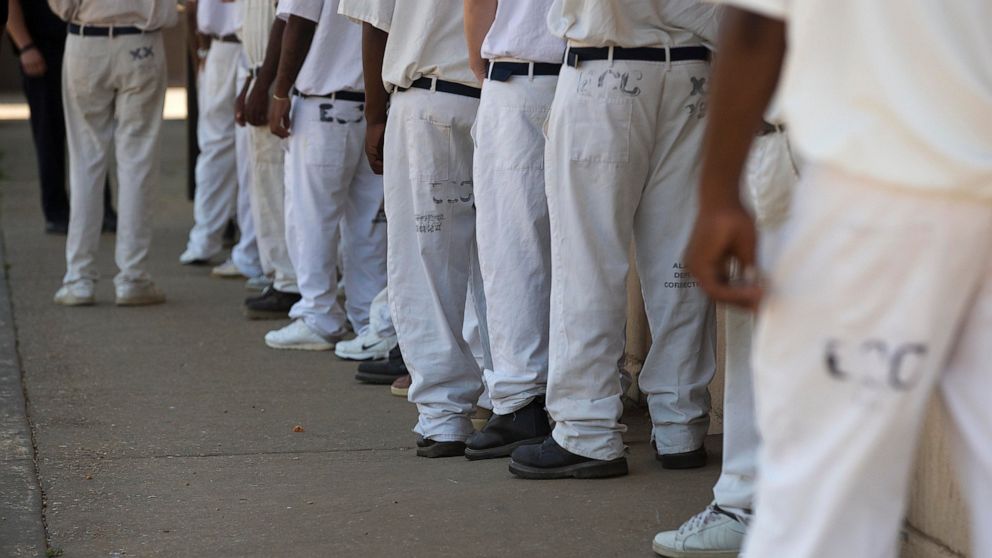
The Justice Department said Wednesday that Alabama is violating the Constitution by failing to protect prison inmates from violence and sexual abuse and housing them in unsafe, overcrowded facilities.
The department gave Alabama 49 days to begin to correct the violations or possibly face another federal lawsuit.
“Our investigation found reasonable cause to believe that Alabama fails to provide constitutionally adequate conditions and that prisoners experience serious harm, including deadly harm, as a result,” Assistant Attorney General Eric Dreiband, who leads the department’s civil rights division, said in a statement.
Gov. Kay Ivey responded with a promise to work together on “an Alabama solution.”
The scathing report released Wednesday condemns virtually every aspect of prison operations, chronicling a “broken system” beset by poor staff training; an inability to prevent drugs and weapons from entering; “and a high level of violence that is too common, cruel, of an unusual nature, and pervasive.”
Because the prison system has failed to turn over certain investigative files it subpoenaed, federal officials said, the level of violence may be “even greater than that which we report.”
The report lays out in stark detail a culture of violence across the state’s 13 prisons for men, which together house roughly 16,000 inmates in among the nation’s most overcrowded conditions.
It chronicles rapes, beatings and fatal stabbings of inmates at the hands of fellow prisoners and decries a management system that undercounts homicides and fails to protect prisoners even when warned of a problem. Staffing shortages, it says, are at a “crisis level.”
In February 2018, one prisoner was killed the day after telling prison officials he’d been threatened in a dispute over a cellphone. In another prison that month, an inmate who’d been disciplined for knife possession fatally stabbed another prisoner in a fight.
Rapes happen day and night in all corners of the prisons — dormitories, cells, showers and recreation areas — the report said. But prison officials often a blind eye, the Justice Department said.
Investigators reviewed more than 600 reported inmate-on-inmate sexual assaults from late 2016 through April 2018, and “did not identify a single incident in which a correctional officer or other staff member observed or intervened,” the report said. “Because of inadequate supervision, correctional officers do not observe the rampant sexual abuse, they do not intervene, and the cycle of abuse continues.”
The report used a single week in September 2017 to illustrate the extent of the problem.
During that span, the report said, two inmates stood guard while two others repeatedly stabbed a prisoner who eventually bled to death. Another inmate was stabbed and had to be evacuated by helicopter. A prisoner in a dorm reserved for inmates with good behavior was attacked with a sock filled with metal locks. A prisoner set fire to another prisoner’s bed blanket. And an inmate died of a drug overdose.
The Southern Poverty Law Center shared with The Associated Press photos from someone inside an Alabama prison that showed inmates stabbed and bloody or dead in their cells. In one photo, a knife sticks out of a man’s back. Other images show what appears to be aftermath of fires set by inmates and knives confiscated by officers.
The prison system documented 24 prisoner homicides between January 2015 and June 2018, but federal officials said that number was an undercount: They identified three more, and said the state sometimes classifies violent deaths as arising from natural causes.
“This is especially concerning given that these incident reports are used for public statistical reporting as required by law,” the letter said.
Alabama’s prisons also have a high suicide rate, and a federal judge in 2017 ruled that the state has provided “horrendously inadequate” care to mentally ill inmates.
“The Justice Department hopes to work with Alabama to resolve the Department’s concerns,” Dreiband wrote. The letter included dozens of recommendations , including the immediate hiring of 500 new corrections officer and eventual addition of 1,500 more.
Ivey said she appreciates the “open lines of communication,” and said the state has already been trying to address problems, citing her proposal to build three new mega-prisons for men.
“Over the coming months, my Administration will be working closely with DOJ to ensure that our mutual concerns are addressed and that we remain steadfast in our commitment to public safety, making certain that this Alabama problem has an Alabama solution,” Ivey said in a statement.
That statement of cooperation is undercut by something else in the letter: The department says it still can’t determine whether Alabama’s prisons are protecting prisoners from excessive force and sexual abuse from staff because its petition to enforce its subpoena for relevant documents remains pending in court.
Alabama also has been trying to address crowding through sentencing reform, but the threat of a federal lawsuit will force the state to address other issues such as sexual assaults said Republican state Sen. Cam Ward, who chairs a legislative prison oversight committee.
“We don’t have much of a choice. Something has got to happen,” Ward said.
This investigation opened in 2016 at the end of the Obama administration, which launched wide-ranging probes of troubled police departments and corrections systems. Some led to agreements to make changes under federal oversight. The Trump administration has been more hands-off, and former Attorney General Jeff Sessions, a longtime Alabama senator, limited the use of such consent decrees before he left office.
“I don’t think there is any dispute that the conditions in Alabama prisons are desperate. They are the worst I’ve seen in 35 years. There is an immediate need for reform,” attorney Bryan Stevenson said. His Equal Justice Initiative asked the Justice Department to investigate the men’s prisons after the department intervened in Alabama’s only prison for women.
Stevenson said state officials need to act with urgency, given “the fact that people are being murdered on a regular basis. That people are being stabbed and raped and assaulted on an almost daily basis. That there is the level of corruption and abuse that we’ve seen among staff.”
———
Tucker contributed from Washington.





